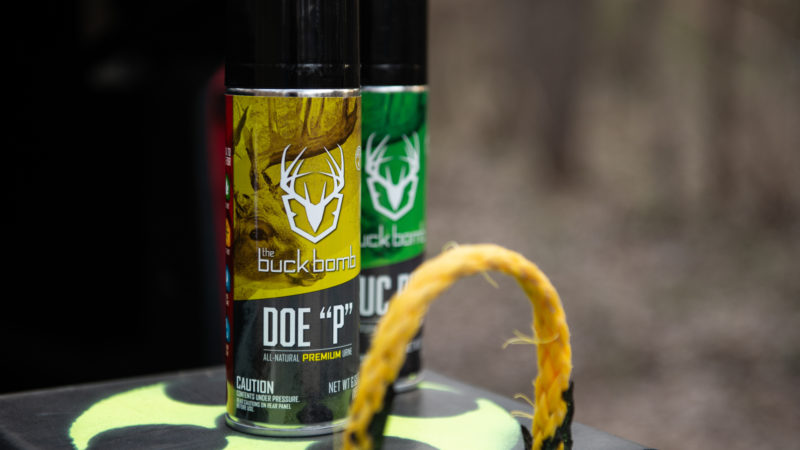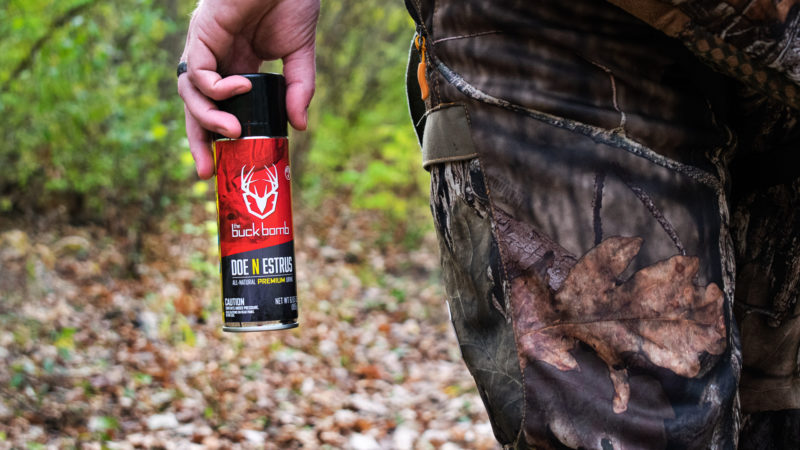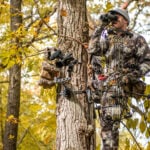The rut is prime time for bowhunters aiming to catch the attention of mature bucks. One of the most effective ways to increase your chances of drawing deer into range during this period is by using scents strategically. Scents mimic the natural cue of a buck looking for does that are in heat, creating opportunities for hunters who know how to deploy them.
As a young teenager, I remember watching VHS tapes of the late Ben Lee, a pioneer in using deer scents and lures. Lee would use tarsal glands from a buck, hanging them on an overhead branch along with a small dose of his scents and lures to attract rutting bucks into close archery range. Watching him and other seasoned hunters like Tom Miranda and Mark June sparked my interest in scent hunting, ultimately inspiring me to pursue an outdoor career. By God’s grace, I achieved that dream in my mid-twenties, starting with an incredible opportunity from Hunters Specialties to work as a field pro staff member.
For eight years, I was able to promote, field test, and hunt with a variety of Hunters Specialties, Primetime scents, and later, Buck Bomb products. Those years of hands-on experience taught me invaluable tips and tricks for using scents—especially during the rut—to lure mature bucks into close archery range, a skill that still benefits my hunts today.

When many hunters think of using scents to help attract bucks, they most often refer to mock scrapes or using scent in a buck’s natural scrape. Yet, when the rut is in full swing, those tactics often do not work as well. During the rut, a buck is not worried about his scrapes or if any does have stopped by to show him some interest.
At this time, some hunters quit using any scents because they say they do not work. I’m afraid I have to disagree; if a hunter changes their tactics and uses the proper lures, scents work amazingly well during the rut.
Understanding Scent Types and Their Use During the Rut
There are several types of scents available, each designed for a specific purpose:
Attractants – Simulate a doe in heat to lure bucks.
Cover Scents – Mask the human odor, making hunters less detectable.
Curiosity Scents – Pique a deer’s curiosity and can draw them in from a distance.
Dominance Scents – Signal the presence of another buck, provoking a territorial response.
During the rut, doe estrous scents (a type of attractant) are particularly the most effective, as they simulate a doe ready to breed. Motivated by the drive to mate, bucks are likely to follow an estrous scent trail. They will also investigate nearby estrous smells when hunters hang scent on a wick, or one of my favorite tactics, which I learned when watching Ben Lee and Tom Miranda, use a trail drag.
The trail drag tactic is used by spraying scent on a rag or a wick, which is tied to a long string, then drug along behind the hunter for a far distance to leave a trail of scent for a buck to follow along like that of a dog trailing the scent of a rabbit. A buck trailing a doe with his nose to the ground is even often referred to as “dogging” a doe.

Choose the Right Scents
Selecting quality scents is crucial, as deer have incredibly sensitive noses and can distinguish between natural and artificial scents. Consider these effective products during the rut:
Hunters Specialties Trail Drag: This product includes a scent drag you can dip in estrus scent and then drag along your trail, leaving a scent trail for bucks to follow.
Buck Bomb 2 Hot Does and Wicks: This scent combines two hot doe scents, creating a powerful lure. The wicks can be hung in shooting lanes or around a stand to enhance scent dispersal.

Apply a Scent Trail
Using a trail drag can lead a buck right to your stand. To set up:
- Start at your truck or trailhead, dip the trail drag in estrous scent, and attach it to your boots or a drag stick.
- Walk along your access trail to your hunting stand, re-dipping the drag every 100 yards for a fresh scent.
- When you reach your stand, hang the scent drag upwind to let the scent disperse naturally.
- Another tactic is to start at the base of the tree you are hunting, spray the scent on the drag, and then drag away from your stand. This allows the scent to get stronger as a buck is trailing, with the most potent point being close to the shooting range.

Scent Mark Key Locations
Around your stand, set up multiple scent locations to maximize your chances:
- Spray estrous spray on low-hanging branches or bushes near shooting lanes.
- Place scent wicks where the breeze can carry the scent across the deer’s travel path. Hang wicks about 3 to 4 feet off the ground, simulating a natural height for deer interactions.

Renew Scent Throughout Your Hunt
Estrous scents lose potency over time, especially in wet or windy conditions. Plan to refresh your scent every 2-3 hours or use scent bombs and wicks that slowly release scent for longer coverage. The Buck Bomb 2 Hot Does aerosol feature is ideal, allowing you to periodically spray scent from your stand with minimal movement.

Misting Scent From Your Stand
Pat Reeves from Driven Hunter TV once gave a scent tip of misting scent from the stand. Still, to this day, I use that tip when hunting in a stand or from my tree saddle. Periodically throughout the hunt, spray an aerosol or liquid estrus scent. The scent will follow the airwaves downwind, allowing bucks to catch the scent and come in close to investigate.

Final Tips for Success
Play the Wind: Position scents upwind from your hunting location to let the scent carry naturally toward any approaching deer.
Use Scent Control: Even while using scents, avoid contaminating the area with human odor. Use scent-eliminating sprays on your gear and clothing.
Stay Observant: Bucks may follow a scent trail from any direction, especially during the rut. Position yourself in a location with a clear view of potential entry points.
Using scents effectively during the rut requires attention to detail and patience, but when done right, it can make the difference between a close encounter and a successful harvest. Following these steps and utilizing the right scent products will increase your odds of drawing that trophy buck into bow range.

 By
By 



